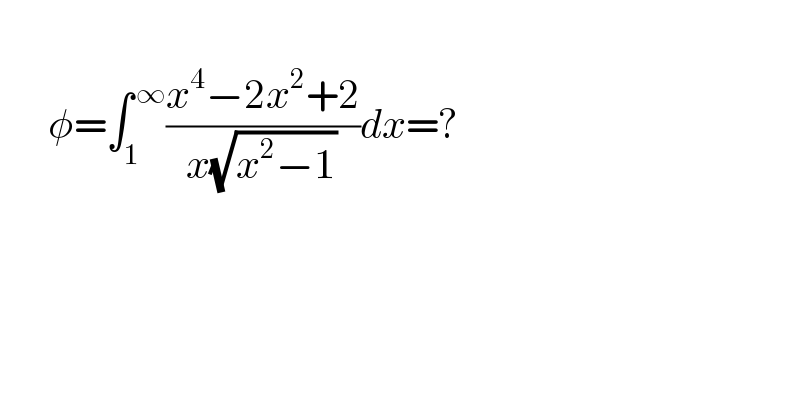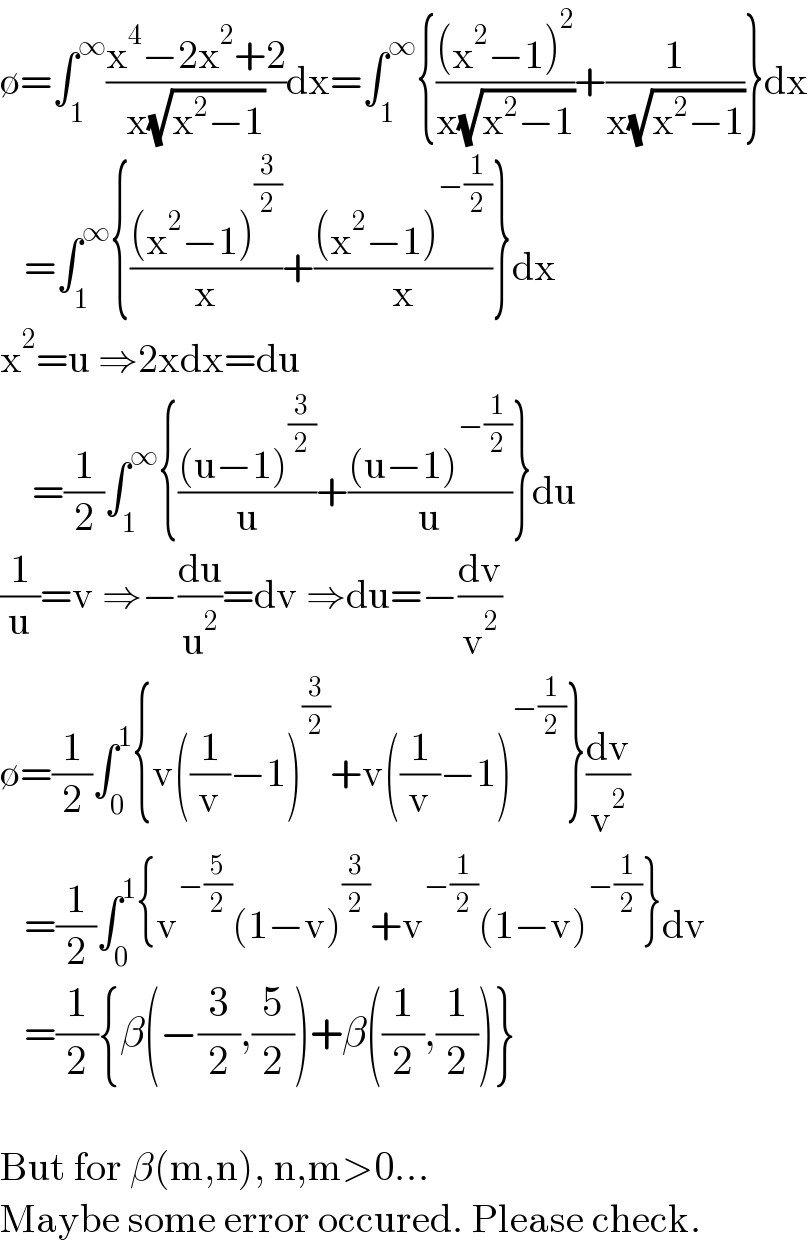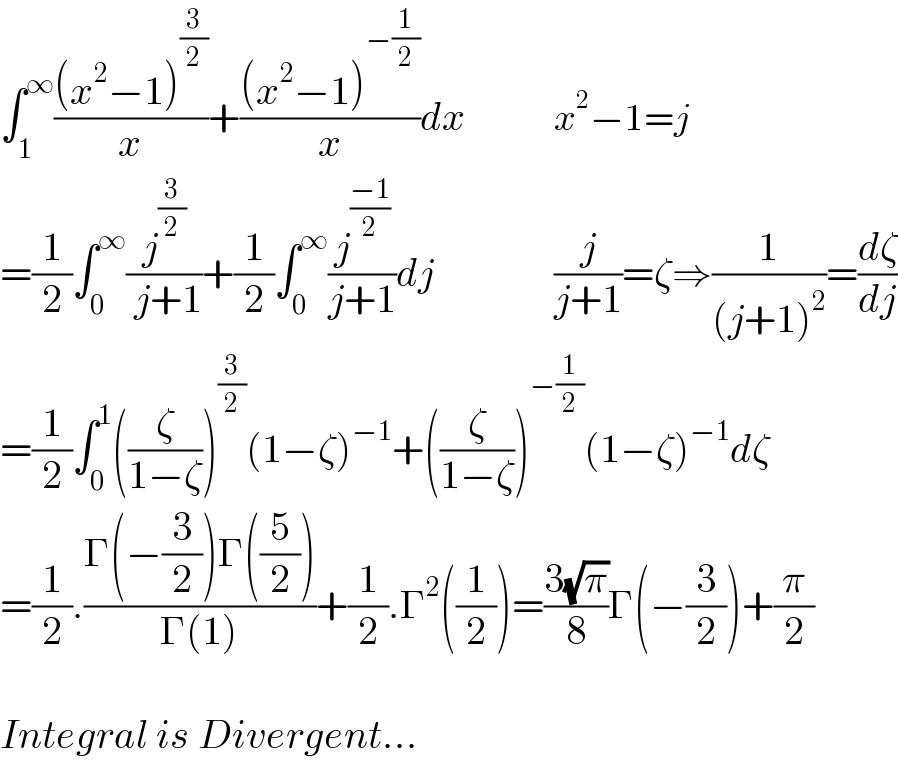Question Number 127929 by mnjuly1970 last updated on 03/Jan/21

$$ \\ $$$$\:\:\:\:\:\:\phi=\int_{\mathrm{1}} ^{\:\infty} \frac{{x}^{\mathrm{4}} −\mathrm{2}{x}^{\mathrm{2}} +\mathrm{2}}{{x}\sqrt{{x}^{\mathrm{2}} −\mathrm{1}}}{dx}=? \\ $$
Answered by Ar Brandon last updated on 03/Jan/21

$$\emptyset=\int_{\mathrm{1}} ^{\infty} \frac{\mathrm{x}^{\mathrm{4}} −\mathrm{2x}^{\mathrm{2}} +\mathrm{2}}{\mathrm{x}\sqrt{\mathrm{x}^{\mathrm{2}} −\mathrm{1}}}\mathrm{dx}=\int_{\mathrm{1}} ^{\infty} \left\{\frac{\left(\mathrm{x}^{\mathrm{2}} −\mathrm{1}\right)^{\mathrm{2}} }{\mathrm{x}\sqrt{\mathrm{x}^{\mathrm{2}} −\mathrm{1}}}+\frac{\mathrm{1}}{\mathrm{x}\sqrt{\mathrm{x}^{\mathrm{2}} −\mathrm{1}}}\right\}\mathrm{dx} \\ $$$$\:\:\:=\int_{\mathrm{1}} ^{\infty} \left\{\frac{\left(\mathrm{x}^{\mathrm{2}} −\mathrm{1}\right)^{\frac{\mathrm{3}}{\mathrm{2}}} }{\mathrm{x}}+\frac{\left(\mathrm{x}^{\mathrm{2}} −\mathrm{1}\right)^{−\frac{\mathrm{1}}{\mathrm{2}}} }{\mathrm{x}}\right\}\mathrm{dx} \\ $$$$\mathrm{x}^{\mathrm{2}} =\mathrm{u}\:\Rightarrow\mathrm{2xdx}=\mathrm{du}\: \\ $$$$\:\:\:\:=\frac{\mathrm{1}}{\mathrm{2}}\int_{\mathrm{1}} ^{\infty} \left\{\frac{\left(\mathrm{u}−\mathrm{1}\right)^{\frac{\mathrm{3}}{\mathrm{2}}} }{\mathrm{u}}+\frac{\left(\mathrm{u}−\mathrm{1}\right)^{−\frac{\mathrm{1}}{\mathrm{2}}} }{\mathrm{u}}\right\}\mathrm{du} \\ $$$$\frac{\mathrm{1}}{\mathrm{u}}=\mathrm{v}\:\Rightarrow−\frac{\mathrm{du}}{\mathrm{u}^{\mathrm{2}} }=\mathrm{dv}\:\Rightarrow\mathrm{du}=−\frac{\mathrm{dv}}{\mathrm{v}^{\mathrm{2}} } \\ $$$$\emptyset=\frac{\mathrm{1}}{\mathrm{2}}\int_{\mathrm{0}} ^{\mathrm{1}} \left\{\mathrm{v}\left(\frac{\mathrm{1}}{\mathrm{v}}−\mathrm{1}\right)^{\frac{\mathrm{3}}{\mathrm{2}}} +\mathrm{v}\left(\frac{\mathrm{1}}{\mathrm{v}}−\mathrm{1}\right)^{−\frac{\mathrm{1}}{\mathrm{2}}} \right\}\frac{\mathrm{dv}}{\mathrm{v}^{\mathrm{2}} } \\ $$$$\:\:\:=\frac{\mathrm{1}}{\mathrm{2}}\int_{\mathrm{0}} ^{\mathrm{1}} \left\{\mathrm{v}^{−\frac{\mathrm{5}}{\mathrm{2}}} \left(\mathrm{1}−\mathrm{v}\right)^{\frac{\mathrm{3}}{\mathrm{2}}} +\mathrm{v}^{−\frac{\mathrm{1}}{\mathrm{2}}} \left(\mathrm{1}−\mathrm{v}\right)^{−\frac{\mathrm{1}}{\mathrm{2}}} \right\}\mathrm{dv} \\ $$$$\:\:\:=\frac{\mathrm{1}}{\mathrm{2}}\left\{\beta\left(−\frac{\mathrm{3}}{\mathrm{2}},\frac{\mathrm{5}}{\mathrm{2}}\right)+\beta\left(\frac{\mathrm{1}}{\mathrm{2}},\frac{\mathrm{1}}{\mathrm{2}}\right)\right\} \\ $$$$ \\ $$$$\mathrm{But}\:\mathrm{for}\:\beta\left(\mathrm{m},\mathrm{n}\right),\:\mathrm{n},\mathrm{m}>\mathrm{0}… \\ $$$$\mathrm{Maybe}\:\mathrm{some}\:\mathrm{error}\:\mathrm{occured}.\:\mathrm{Please}\:\mathrm{check}. \\ $$
Commented by Ar Brandon last updated on 03/Jan/21

$$\emptyset=\frac{\mathrm{1}}{\mathrm{2}}\left\{\beta\left(−\frac{\mathrm{3}}{\mathrm{2}},\:\frac{\mathrm{5}}{\mathrm{2}}\right)+\frac{\Gamma\left(\frac{\mathrm{1}}{\mathrm{2}}\right)\Gamma\left(\frac{\mathrm{1}}{\mathrm{2}}\right)}{\Gamma\left(\mathrm{1}\right)}\right\} \\ $$$$\:\:\:=\frac{\mathrm{1}}{\mathrm{2}}\beta\left(−\frac{\mathrm{3}}{\mathrm{2}},\:\frac{\mathrm{5}}{\mathrm{2}}\right)+\frac{\pi}{\mathrm{2}} \\ $$
Commented by mnjuly1970 last updated on 03/Jan/21

$${thank}\:{you}\:{so}\:{muvh}\: \\ $$$${you}\:{are}\:{right} \\ $$$${integral}\:{is}\:{divergent}.. \\ $$$${grateful}\:… \\ $$
Commented by Ar Brandon last updated on 03/Jan/21

$$\mathrm{My}\:\mathrm{pleasure},\:\mathrm{Sir} \\ $$
Answered by Dwaipayan Shikari last updated on 03/Jan/21

$$\int_{\mathrm{1}} ^{\infty} \frac{\left({x}^{\mathrm{2}} −\mathrm{1}\right)^{\frac{\mathrm{3}}{\mathrm{2}}} }{{x}}+\frac{\left({x}^{\mathrm{2}} −\mathrm{1}\right)^{−\frac{\mathrm{1}}{\mathrm{2}}} }{{x}}{dx}\:\:\:\:\:\:\:\:\:\:\:{x}^{\mathrm{2}} −\mathrm{1}={j} \\ $$$$=\frac{\mathrm{1}}{\mathrm{2}}\int_{\mathrm{0}} ^{\infty} \frac{{j}^{\frac{\mathrm{3}}{\mathrm{2}}} }{\:{j}+\mathrm{1}}+\frac{\mathrm{1}}{\mathrm{2}}\int_{\mathrm{0}} ^{\infty} \frac{{j}^{\frac{−\mathrm{1}}{\mathrm{2}}} }{{j}+\mathrm{1}}{dj}\:\:\:\:\:\:\:\:\:\:\:\:\:\:\:\frac{{j}}{{j}+\mathrm{1}}=\zeta\Rightarrow\frac{\mathrm{1}}{\left({j}+\mathrm{1}\right)^{\mathrm{2}} }=\frac{{d}\zeta}{{dj}} \\ $$$$=\frac{\mathrm{1}}{\mathrm{2}}\int_{\mathrm{0}} ^{\mathrm{1}} \left(\frac{\zeta}{\mathrm{1}−\zeta}\right)^{\frac{\mathrm{3}}{\mathrm{2}}} \left(\mathrm{1}−\zeta\right)^{−\mathrm{1}} +\left(\frac{\zeta}{\mathrm{1}−\zeta}\right)^{−\frac{\mathrm{1}}{\mathrm{2}}} \left(\mathrm{1}−\zeta\right)^{−\mathrm{1}} {d}\zeta \\ $$$$=\frac{\mathrm{1}}{\mathrm{2}}.\frac{\Gamma\left(−\frac{\mathrm{3}}{\mathrm{2}}\right)\Gamma\left(\frac{\mathrm{5}}{\mathrm{2}}\right)}{\Gamma\left(\mathrm{1}\right)}+\frac{\mathrm{1}}{\mathrm{2}}.\Gamma^{\mathrm{2}} \left(\frac{\mathrm{1}}{\mathrm{2}}\right)=\frac{\mathrm{3}\sqrt{\pi}}{\mathrm{8}}\Gamma\left(−\frac{\mathrm{3}}{\mathrm{2}}\right)+\frac{\pi}{\mathrm{2}} \\ $$$$ \\ $$$${Integral}\:{is}\:{Divergent}… \\ $$
Commented by Ar Brandon last updated on 03/Jan/21

$$\mathrm{cool}\:\mathrm{bro} \\ $$😃
Commented by Dwaipayan Shikari last updated on 03/Jan/21

$$\int_{\mathrm{0}} ^{\infty} \frac{{j}^{{n}} }{{j}+\mathrm{1}}{dj}\:\:{is}\:{convergent}\:{when}\:\:\:\:\mathrm{0}<{n}<−\mathrm{1} \\ $$
Commented by Dwaipayan Shikari last updated on 03/Jan/21

$$ \\ $$🍎
